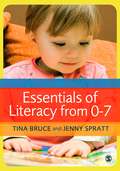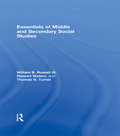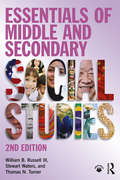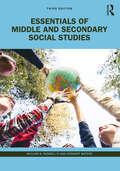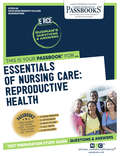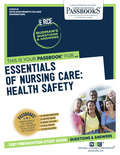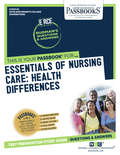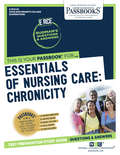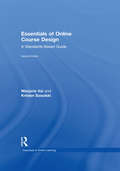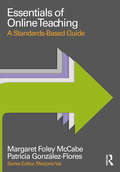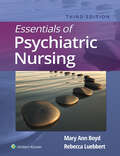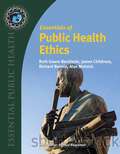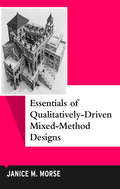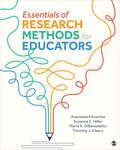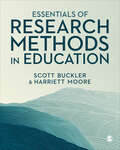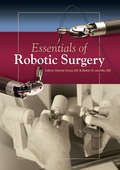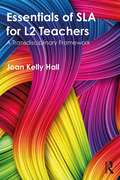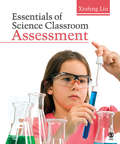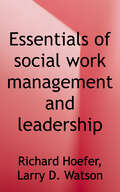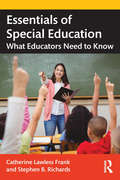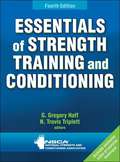- Table View
- List View
Essentials of Literacy from 0-7: A Whole-Child Approach to Communication, Language and Literacy
by Tina Bruce Jenny SprattChildren flourish in their development and learning when practitioners and parents work together. Childrens′ development and learning are further enhanced when interconnected knowledge and understanding work together. In this new edition the authors guide readers in understanding of child development. They highlight the need for those who work with young children to become reflective practitioners. Through a focus on the introduction of nursery rhymes, finger rhymes, action songs and poetry cards, the authors provide a gentle, child-friendly way to develop literacy 0-7. Thoroughly revised and updated, this book includes: - Case studies and examples - Discussion of the primary framework - Inclusion of schools as an educational setting - Age-appropriate activities - Further reading suggestions at the end of each chapter This book is useful for teachers, practitioners, teaching assistants and childminders and for anyone working with children from birth to seven years in nursery and primary schools, children′s centres, foundation units, and at home. Tina Bruce is an Honorary visiting professor in Early Childhood at Roehampton University. Jenny Spratt is Head of EYFS and Children′s Centre Services for Peterborough Local Authority
Essentials of Middle and Secondary Social Studies
by Thomas N. Turner Stewart Waters William B. Russell IIIBuilding on the success of a much-loved elementary text, Essentials of Middle and Secondary Social Studies focuses on the key issues central to the actual teaching of middle and high school social studies, including lesson planning and inclusive instructional strategies. Written in an engaging, conversational style, the text encourages teachers in their development as professionals and enables them to effectively use creative and active learning strategies in the everyday classroom. Features of the book include: • A full chapter on lesson plans designed to provide middle and secondary social studies teachers with classroom tested lesson plans. The chapter includes two classroom tested lessons for each social science discipline---U.S. History, World History, Geography, Government, Economics, Psychology, & Sociology. • A chapter on technology that is designed to better prepare middle and secondary social studies teachers to effectively teach social studies with technology. Attention is given to digital history, media literacy, teaching with film and music, and numerous other types of impactful technology.• Each teaching methodology and lesson plan discusses how the strategy can be used to meet the individual needs of diverse learners, including English Language Learners and exceptional education students. • A section in each chapter provides various resources for further development. The section includes articles, books, and web resources. • Each chapter includes an “Extension” activity offering readers with the opportunity to extend the learning experience with relevant and meaningful real-life scenarios. • “Focus activities” give readers the opportunity to prepare for the learning experience with relevant and meaningful scenarios. • Covers current topics such as NCSS Standards, Common Core State Standards, Technology, Media, Skills, Character Education, and Literacy.
Essentials of Middle and Secondary Social Studies
by Thomas N. Turner Stewart Waters William B. Russell IIIBuilding on the success of the first edition, Essentials of Middle and Secondary Social Studies 2nd Edition focuses on the key issues central to the teaching of middle and high school social studies, including lesson planning and instructional strategies. Written in an engaging, conversational style, the text encourages teachers in their development as professionals and enables them to effectively use creative and active learning strategies in the everyday classroom. NEW TO THIS EDITION This second edition has been significantly refined with new and relevant topics and strategies needed for effectively teaching middle and secondary social studies. New features include: An updated chapter on lesson plans, in keeping with the book’s emphasis on planning and teaching. This chapter is designed to provide middle and secondary teachers with new classroom-tested lesson plans and includes two classroom-tested lessons for each grade level (6-12). An expanded chapter on planning. This chapter provides additional discussion about long-range planning and includes examples of lesson plans with details to help students be better prepared. An updated chapter on technology designed to better prepare middle and secondary teachers to effectively incorporate technology into social studies instruction. Attention is given to digital history, media literacy, teaching with film and music, popular apps and numerous other types of impactful technology. "FYI" callouts throughout each chapter. These callouts provide helpful information and further explanation. An expanded discussion of the Common Core Standards and C3 Framework and how they impact teachers. An updated chapter titled "Experiencing Social Studies." This chapter focuses on topics such as teaching with drama, role play, field trips, and service learning. A "Helpful Resources" section that details various websites and online resources for further discovery.
Essentials of Middle and Secondary Social Studies
by Stewart Waters William B. Russell IIIBuilding on the success of the previous editions, Essentials of Middle and Secondary Social Studies Third Edition focuses on the key issues central to the teaching of middle and high school social studies, including lesson planning and instructional strategies. Written in an engaging, conversational style, the text encourages teachers in their development as professionals and enables them to effectively use creative and active learning strategies in the everyday classroom. New to This Edition This third edition has been refined with new and relevant topics and strategies needed for effectively teaching middle and high school social studies. New features include: An expanded chapter on the decision-making process in secondary social studies. This chapter provides additional discussion about the importance of helping middle and high school learners better understand the decision-making process and offers strategies for helping teachers make connections between choices, values, character development, and social justice. An updated chapter on technology designed to better prepare secondary social studies teachers to effectively incorporate technology into their instruction. Focus is given to virtual teaching and learning, media literacy, teaching with film, and numerous other ways to improve teaching and learning in the digital age. Updated further readings and helpful resources for all chapters to include supplemental digital and video sources related to various topics throughout the chapter. These resources were specifically curated to be impactful for preservice and in-service teachers, as well as anyone teaching secondary social studies methods courses. Added a "Checking for Understanding" section of questions at the end of each chapter that focuses on comprehension, application, and reflection on key concepts throughout the chapters. An expanded discussion of the Common Core Standards and C3 Framework and how it impacts teachers. An updated chapter titled "Experiencing Social Studies". This chapter focus on topics such as teaching with drama, role play, field trips, and service learning. Each chapter includes a "Helpful Resources" section that details various websites and online resources for further discovery.
Essentials of Nursing Care: Passbooks Study Guide (Excelsior/Regents College Examination Series)
by National Learning CorporationThe Excelsior/Regents College Examinations (E/RCE) offer you an opportunity to obtain recognition for college-level learning and consists of exams designed to demonstrate achievement and mastery of various college-level subjects, such as the Arts and Sciences, Business, Criminal Justice, Education, Health and Nursing. The E/RCE Essentials of Nursing Care: Reproductive Health Passbook® prepares you by sharpening knowledge of the skills and concepts necessary to succeed on the upcoming exam and the college courses that follow. It provides a series of informational texts as well as hundreds of questions and answers in the areas that will likely be covered on your upcoming exam.
Essentials of Nursing Care: Passbooks Study Guide (Excelsior/Regents College Examination Series)
by National Learning CorporationThe Excelsior/Regents College Examinations (E/RCE) offer you an opportunity to obtain recognition for college-level learning and consists of exams designed to demonstrate achievement and mastery of various college-level subjects, such as the Arts and Sciences, Business, Criminal Justice, Education, Health and Nursing. The E/RCE Essentials of Nursing Care: Health Safety Passbook® prepares you by sharpening knowledge of the skills and concepts necessary to succeed on the upcoming exam and the college courses that follow. It provides a series of informational texts as well as hundreds of questions and answers in the areas that will likely be covered on your upcoming exam.
Essentials of Nursing Care: Passbooks Study Guide (Excelsior/Regents College Examination Series)
by National Learning CorporationThe Excelsior/Regents College Examinations (E/RCE) offer you an opportunity to obtain recognition for college-level learning and consists of exams designed to demonstrate achievement and mastery of various college-level subjects, such as the Arts and Sciences, Business, Criminal Justice, Education, Health and Nursing. The E/RCE Essentials of Nursing Care: Health Differences Passbook® prepares you by sharpening knowledge of the skills and concepts necessary to succeed on the upcoming exam and the college courses that follow. It provides a series of informational texts as well as hundreds of questions and answers in the areas that will likely be covered on your upcoming exam.
Essentials of Nursing Care: Passbooks Study Guide (Excelsior/Regents College Examination Series)
by National Learning CorporationThe Excelsior/Regents College Examinations (E/RCE) offer you an opportunity to obtain recognition for college-level learning and consists of exams designed to demonstrate achievement and mastery of various college-level subjects, such as the Arts and Sciences, Business, Criminal Justice, Education, Health and Nursing. The E/RCE Essentials of Nursing Care: Chronicity Passbook® prepares you by sharpening knowledge of the skills and concepts necessary to succeed on the upcoming exam and the college courses that follow. It provides a series of informational texts as well as hundreds of questions and answers in the areas that will likely be covered on your upcoming exam.
Essentials of Online Course Design: A Standards-Based Guide (Essentials of Online Learning)
by Marjorie Vai Kristen SosulskiIn spite of the proliferation of online learning, creating online courses can still evoke a good deal of frustration, negativity, and wariness in those who need to create them. The second edition of Essentials of Online Course Design takes a fresh, thoughtfully designed, step-by-step approach to online course development. At its core is a set of standards that are based on best practices in the field of online learning and teaching. Pedagogical, organizational, and visual design principles are presented and modeled throughout the book, and users will quickly learn from the guide’s hands-on approach. The course design process begins with the elements of a classroom syllabus which, after a series of guided steps, easily evolve into an online course outline. The guide’s key features include: a practical approach informed by theory clean interior design that offers straightforward guidance from page one clear and jargon-free language examples, screenshots, and illustrations to clarify and support the text a checklist of online course design standards that readers can use to self-evaluate. a Companion Website with examples, adaptable templates, interactive learning features, and online resources: http://essentialsofonlinecoursedesign.com Essentials of Online Course Design serves as a best practice model for designing online courses. After reading this book, readers will find that preparing for online teaching is a satisfying and engaging experience. The core issue is simply good design: pedagogical, organizational, and visual. For more of Marjorie Vai in her own words, listen to this 2011 interview from the On Teaching Online podcast: http://onteachingonline.com/oto-16-essentials-of-online-course-design-with-marjorie-vai/
Essentials of Online Teaching: A Standards-Based Guide (Essentials of Online Learning)
by Margaret Foley McCabe Patricia González-FloresTeachers’ active online participation and engagement with students are critical factors to the success of online courses. Essentials of Online Teaching is a standards-based, straightforward guide to teaching online in higher education, high school and vocational training, or corporate learning environments. This brief but powerful book encourages immediate application of concepts with the help of real-world examples, technical insights, and professional advice. The guide includes: a practical approach informed by, but not about, relevant learning theories; clear models and examples from a wide variety of online courses; teachers’ reflections about their online practice; a checklist of standards to help guide teaching decisions; and an accompanying website (www.essentialsofonlineteaching.com) with additional resources. Essentials of Online Teaching addresses key instructional challenges in online teaching and presents the reader with practical solutions for each phase of a course—preparation, beginning, middle, and end.
Essentials of Psychiatric Nursing
by Mary Ann Boyd Rebecca LuebbertHelp beginning nursing students gain the basic knowledge, therapeutic communication capabilities, and patient interaction skills to confidently prepare for psychiatric nursing practice. Easy to use and backed by the latest clinical evidence, Essentials of Psychiatric Nursing, 3rd Edition, is rich with clinical examples and explanations that help clarify challenging concepts and equip students for success as entry-level nurses. Whether used in dedicated psychiatric nursing courses or for integrating psychiatric nursing principles into an existing course, this engaging text establishes the fundamental understanding students need to effectively care for individuals with emotional and mental health problems in any healthcare setting. New and Updated Features NEW! Content helps students recognize and address the effects of COVID-19 on mental health and embrace changes in the practice and delivery of mental health nursing, such as virtual therapy. UPDATED! Coverage of veteran care empowers students to confidently manage specific mental health issues affecting military veterans and their families. UPDATED! Community nursing care coverage helps students make a confident transition to practice outside of traditional hospital settings, increasing their career prospects.
Essentials of Psychology: Concepts and Applications (Fourth Edition)
by Jeffrey S. NevidThe new edition of this brief introductory text retains the hallmark features that have made its parent text unique, while offering a more manageable, student-friendly format. The book was written with three goals in mind: to make the study of psychology accessible and engaging to the beginning student in psychology, to provide students with a solid grounding in the knowledge base in psychology, and to help students succeed in the course. Nevid’s comprehensive learning system-derived from research on memory, learning, and textbook pedagogy-is featured throughout. This learning model incorporates what the author calls the Four E’s of Effective Learning-Engaging Student Interest, Encoding Information, Elaborating Meaning, and Evaluating Progress. ESSENTIALS OF PSYCHOLOGY: CONCEPTS AND APPLICATIONS, 4th Edition, provides a broad view of psychology as well as applications of the knowledge gained from contemporary research to the problems and challenges we face in today’s world.
Essentials of Public Health Ethics
by James F. Childress Alan Melnick Ruth Gaare Bernheim Richard J BonnieAs threats of infectious disease grow and the nation confronts chronic health problems such as diabetes and obesity, health professionals, citizens, and community stakeholders must address increasingly complex ethical conflicts about public health policies and practices. Essentials of Public Health Ethics introduces students to the field of public health ethics, by focusing on cases. Topics span the discipline of public health and integrate materials, concepts, and frameworks from numerous fields in public health, such as health promotion, environmental health and health policy. By delving into both historical and contemporary cases, including international cases, the authors investigate the evolution and impact of various understandings of the concept of “the public” over time, i.e., the public not only as a numerical population that can be defined and measured, but also as a political group with legally defined obligations and relationships, as well as diverse cultural and moral understandings. While the text examines a range of philosophical theories and contemporary perspectives, it is written in a way that presupposes no previous exposure to the philosophical concepts but at the same time provides challenging cases for students who do have more advanced knowledge. Thus the book should be useful in Schools and Programs in Public Health as well as for undergraduate public health courses in liberal arts institutions and for health sciences students at the advanced undergraduate and graduate levels.
Essentials of Qualitatively-Driven Mixed-Method Designs (Qualitative Essentials #14)
by Janice M. MorseIn a mixed-method tradition that privileges the quantitative, leading qualitative researcher Janice Morse breaks new ground by arguing the importance of research designs for which the primary component is qualitative, and contains either a quantitative or a qualitative supplemental strategy. Using a variety of examples and visual prompts, Morse convincingly demonstrates that such designs allow novice researchers to obtain answers more quickly and with more certainty. Her book provides clear and concise explanations making even complex research designs understandable to the beginning researcher; argues for the importance of primary qualitative designs due to their theoretical strength; stresses the importance of using goal-directed actions and analyses that do not violate the assumptions of either qualitative or quantitative inquiry.
Essentials of Research Methods for Educators
by Anastasia Kitsantas Timothy Cleary Maria K DiBenedetto Suzanne E. HillerEssentials of Research Methods for Educators provides future teachers, specialists, administrators and educational leaders with a textbook and a resource that goes beyond the classroom to use in your career. With a focus on the wide variety of data available to educators and the importance of data literacy for all those involved in education, this book presents research methods in a relatable educational context with a variety of concrete examples. The authors use their expertise in educational psychology to optimize learning. The structure of the book breaks down research into discrete steps with the "Let′s See It," "Let′s Do It," and "You Do It" steps for each chapter so students feel motivated to complete their research projects. By covering qualitative, quantitative, and mixed methods research, with additional chapters on action research and program evaluation, students get a complete picture of the current research methods landscape. This highly scaffolded book supports future educational leaders in incorporating research and methods into their work and life.
Essentials of Research Methods for Educators
by Anastasia Kitsantas Timothy Cleary Maria K DiBenedetto Suzanne E. HillerEssentials of Research Methods for Educators provides future teachers, specialists, administrators and educational leaders with a textbook and a resource that goes beyond the classroom to use in your career. With a focus on the wide variety of data available to educators and the importance of data literacy for all those involved in education, this book presents research methods in a relatable educational context with a variety of concrete examples. The authors use their expertise in educational psychology to optimize learning. The structure of the book breaks down research into discrete steps with the "Let′s See It," "Let′s Do It," and "You Do It" steps for each chapter so students feel motivated to complete their research projects. By covering qualitative, quantitative, and mixed methods research, with additional chapters on action research and program evaluation, students get a complete picture of the current research methods landscape. This highly scaffolded book supports future educational leaders in incorporating research and methods into their work and life.
Essentials of Research Methods in Education
by Scott Buckler Harriett MooreThis book provides a comprehensive overview of research methods, supported by examples from a range of educational fields, along with pragmatic advice and guidance on how to undertake educational research. Using the concept of research as a ‘quest’, this book takes you on a journey from planning stages, through data collection to analysis, to writing up your findings, at each stage exploring the principles and practice that can support your own educational research projects. Academic understanding is combined with practical commentary to show how conceptual ideas are used in practice. Case studies throughout the book highlight the power of educational research to shine a light on important social issues. This is essential reading for students on all education courses that include a research methods module or project. Scott Buckler PhD is an independent academic, Chartered Teacher and Chartered Psychologist. Harriett Moore is a school-based practitioner with a broad background in research.
Essentials of Research Methods in Education
by Scott Buckler Harriett MooreThis book provides a comprehensive overview of research methods, supported by examples from a range of educational fields, along with pragmatic advice and guidance on how to undertake educational research. Using the concept of research as a ‘quest’, this book takes you on a journey from planning stages, through data collection to analysis, to writing up your findings, at each stage exploring the principles and practice that can support your own educational research projects. Academic understanding is combined with practical commentary to show how conceptual ideas are used in practice. Case studies throughout the book highlight the power of educational research to shine a light on important social issues. This is essential reading for students on all education courses that include a research methods module or project. Scott Buckler PhD is an independent academic, Chartered Teacher and Chartered Psychologist. Harriett Moore is a school-based practitioner with a broad background in research.
Essentials of Robotic Surgery
by Stefan W. Leichtle Manak SoodThe field of robotic surgery is dynamic and fascinating. Surgical robots currently perform a wide range of procedures across a diverse group of specialties, and they have proven to exhibit a number of significant advantages over manual surgeries, including increased precision, less blood loss and pain, and shorter recovery times. In a rapidly changing world of technology, healthcare organizations may find it difficult to determine how to incorporate robotically-assisted surgical techniques into their systems..Essentials of Robotic Surgery provides comprehensive, detailed analysis of the current developments in robotically assisted surgery. Covered in the book are the most notable, current surgical applications, from coronary revascularization to prostate surgery, from the lungs and esophagus to the uterus, from sleep apnea to head and neck cancer..Edited by Drs. Manak Sood and Stefan W. Leichtle, this book details the history of robotic surgical technologies and techniques, while looking ahead to the possibilities contained within future applications. Essentials of Robotic Surgery is an ideal resource for healthcare professionals who are considering whether robotic surgeries may be right for their organization.
Essentials of SLA for L2 Teachers: A Transdisciplinary Framework
by Joan Kelly HallEssentials of SLA for L2 Teachers: A Transdisciplinary Framework presents an accessible and comprehensive account of current understandings of second language acquisition (SLA) geared towards those studying to become L2 teachers. Grounded in the pragmatic and problem-oriented transdisciplinary framework of SLA, this textbook draws connections between SLA research and practices for L2 teaching. It aims to build L2 teacher expertise by strengthening teachers’ understandings of the many facets of L2 learning and their skills for designing transformative learning environments in their teaching contexts. The author includes pedagogical implications and inquiry-based activities in each chapter that engage readers in further explorations of the topics covered in the chapter. Short and straightforward, Essentials of SLA for L2 Teachers is the ideal main resource for SLA courses taught at undergraduate and graduate-level teaching programs.
Essentials of Science Classroom Assessment
by Xiufeng LiuA concise science assessment text that helps K–12 teachers master the effective science assessment methods that lead to improved student learning Presenting both traditional and innovative assessment methods integral to science teaching and learning, Essentials of Science Classroom Assessment shows teachers the connection between effective science assessment and improved student learning. The text uses a competence-based approach consistent with the National Science Education Standards to help teachers master assessment skills, apply them to science classroom instruction, and evaluate their impact on student learning. Key Features and BenefitsProvides practical examples from both elementary and secondary science classrooms to demonstrate how to design a wide variety of traditional and innovative assessment methodsPresents case scenarios in each chapter that help teachers reflect on the assessment issues they will encounter in their own classrooms Includes end-of-chapter checklists and practice questions that allow readers to check their mastery of assessment skills before moving on, as well as annotated bibliographies that direct them to additional readings on topics of interest
Essentials of Social Work Management and Leadership: A Competency-based Approach
by Richard Hoefer Larry D. WatsonEssentials of Social Work Management and Leadership: A Competency-based Approach helps students not only build critical knowledge but also cultivate the unique skills that will help them develop into competent and successful managers and leaders. <p><p>Experiential exercises, informative case studies, and carefully crafted assignments based on the 2015 Council on Social Work Education's (CSWE) Educational Policy Accreditation Standards (EPAS) show students how to apply key concepts to gain career success. Each chapter of the text combines knowledge with competency-building exercises that fit into a newly refined conceptual model of the material. The model places the 2015 CSWE EPAS into strategic categories according to orientation, helping readers better understand how each skill functions within the discipline and how collectively, they can support a thriving and effective social work practice. The text delivers excellent insight, opportunities for action, and material that inspires students to become effective, confident, and capable leaders. Essentials of Social Work Management and Leadership is well suited for courses in social work and nonprofit leadership and management at a specialized or advanced level. <p><p>The text is co-sponsored by The Network for Social Work Management, an international organization focused on strengthening and advancing social work management within health and human services.
Essentials of Sociology (12th Edition)
by James M. HenslinFor courses in Introductory Sociology. A down-to-earth approach to sociology. Essentials of Sociology highlights the sociology of everyday life and its relevance to students' lives. With wit, personal reflection, and illuminating examples, author James Henslin stimulates students' sociological imaginations so they can better perceive how the pieces of society fit together. Six central themes guide students through this concise overview of the discipline: a down-to-earth approach, globalization, cultural diversity, critical thinking, the new technology, and the influence of the mass media on our lives. The Twelfth Edition has been extensively revised to include contemporary examples and fresh topics that bring sociology to life.
Essentials of Special Education: What Educators Need to Know
by Stephen B. Richards Catherine Lawless FrankIn this succinct yet comprehensive text, authors Lawless Frank and Richards guide readers through the essential basics that every educator needs to know about special education, covering everything from law to application. Streamlined and accessible chapters address legal knowledge – Section 504, IDEA, ESSA, and FERPA — assessment and identification, RTI, categories of disability, IEPs, accommodations, co-teaching, and instructional considerations. Designed to give new educators a focused introduction to critical concepts and terminology, this book also features supplemental online resources including an Instructor’s Manual, quizzes, and more.
Essentials of Strength Training and Conditioning
by National Strength Conditioning Association Staff Greg Haff N. Travis TriplettDeveloped by the National Strength and Conditioning Association, Essentials of Strength Training and Conditioning, Fourth Edition, is the fundamental preparation text for the CSCS exam as well as a definitive reference that strength and conditioning professionals will consult in everyday practice.
